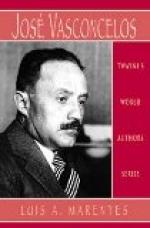|
This section contains 824 words (approx. 3 pages at 300 words per page) |

|
José Vasconcelos, the Mexican politician and philosopher, was born in Oaxaca. Vasconcelos was active in the Mexican revolution, directed the reform of Mexican education as secretary of education in the early 1920s, ran unsuccessfully for the presidency in 1929, and subsequently was exiled for a time. He was rector of the National University of Mexico, visiting professor at the University of Chicago, and director of the Biblioteca Nacional de México. The sources of his philosophy were Pythagoras, Plotinus, Arthur Schopenhauer, Friedrich Nietzsche, A. N. Whitehead, and especially Henri Bergson. Of Latin American philosophers, Vasconcelos is the most original, venturesome, and impassioned.
He called his philosophy aesthetic monism, scientific realism, and organic logic. The system he developed stressed intuition in addition to scientific experience; the particular, concrete, and heterogeneous; organic wholes; the fluid, living, and psychical; and the methods of art...
|
This section contains 824 words (approx. 3 pages at 300 words per page) |

|


